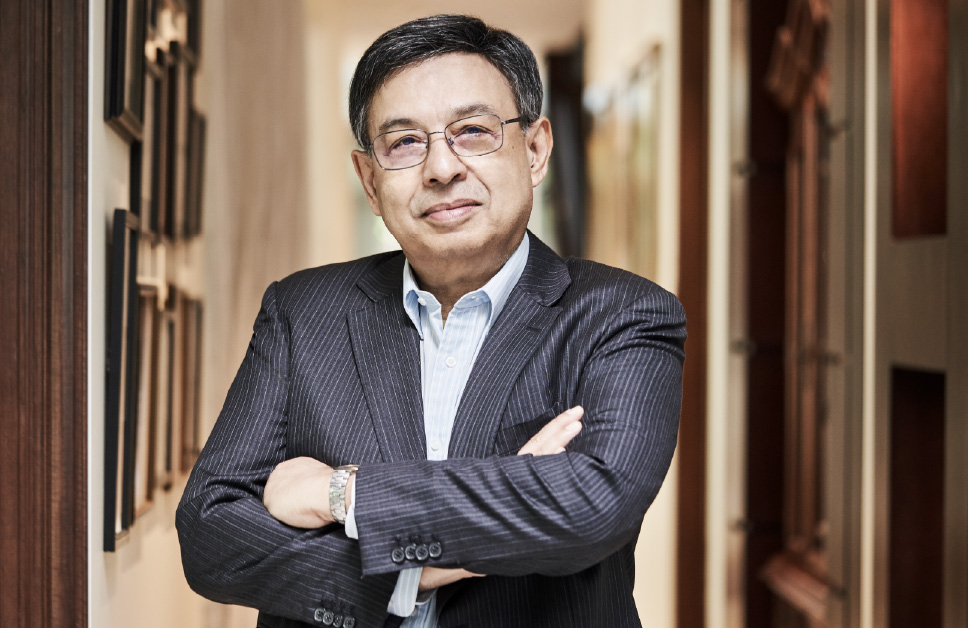From the Chairman's Desk

2020 was looking to be a milestone year of ambition and action for many, but our plans took a sharp detour with the pandemic. Finding a path forward proved to be more challenging than before but it is safe to say that we are all settling into the routines of a new normal albeit a vulnerable and uncertain future.
Globally, nearly 9 in 10 people want the world to change instead of returning to how it was. A new global Ipsos survey for the World Economic Forum unveiled a profound and widespread desire for a world that is significantly more sustainable and equitable.1
We must agree that this evolving crisis is not an isolated incident. It is a link in a larger chain of climate inaction, destruction of habitats, breakdown in public health systems, and widening income gaps that were exacerbated and brought to light by this pandemic. Suffice to say, we should not go back to business-as-usual. We need to invest in the right response in an inclusive way so that it can be an opportunity not just for the environment, but also for human-centered impact such as economic independence and equal opportunities to access education and healthcare.
Why the SE model is even more relevant now?
There is an accelerated need for countries, communities, and businesses to rethink what it means to thrive in a post-COVID-19 world. Businesses especially, play a significant role in the responsibility for environmental, societal, governance (ESG) issues as they can be stewards of change for a liveable future. People, Planet, and Profit - all these 3Ps need to be viewed with a lens of taking active steps towards positive impact as opposed to the perennial conversations surrounding the mere reduction of negative effects for us to truly flourish.
More so than ever, companies are stepping up to contribute their resources to those in need and restructuring their corporate sustainability policies for the long term with the realisation that a social impact strategy is a must-have to attract and retain key stakeholders - clients, partners, and staff alike. Thus, providing these Corporates with a competitive advantage to place their brand in the hearts and minds of the consumers who are becoming increasingly purpose-driven.
Meaning and Purpose
In my opinion, the Social Enterprise model is well-poised to provide the delicate balance of measurable social impact and a sustainable revenue model. These are the businesses of the future; every enterprise should endeavour to be a Social Enterprise. They provide the new generation of talent with the meaning and purpose they are searching for in a job – the emotional significance of why we do what we do and the cumulative effect of those meaningful goals.
We have seen many Social Enterprises fight the good fight these past 20 months as the economic impact of the pandemic hit the vulnerable community much harder. Work-from-home restrictions threw a spanner in the developments of many beneficiaries who were progressing well with their interventions. Social Entrepreneurs were faced with complex decisions of balancing beneficiary regression and their receding bottom lines.
It is commendable that they have shown resilience in their fight against the pandemic, in finding new pathways to engage those who are dependent on their success as a business. It is a testament of their commitment to being a ‘BusinessForGood’ by ensuring both their business sustainability and social impact outcomes, which has proven to be especially valuable in such trying times.
Stay United @ raiSE
In my last message in 2020, I alluded to the fact that we are only as strong as we are united. The team at raiSE has been working alongside many of our member SEs as they pivot and rebuild for a brighter tomorrow. Social Entrepreneurs rallied around and galvanised into action to support one another through bartering services and exchanging best practices.
The acknowledgement of their collective impact was evident from the outpouring of support we witnessed from the private sector, from skilled-based volunteering efforts to grants that were made readily available for ground-up initiatives.
In Singapore, the Social Enterprise Ecosystem is a strong and resilient one that will be able to weather the storm, but it is incomplete without you. Your support for the SE ecosystem as a consumer, a partner, and/or as an impact investor is crucial in building a more sustainable and equitable world together.
In closing, I would like to acknowledge the support and contributions of my colleagues at raiSE, my fellow board members, and all of our stakeholders – Thank you for always being part of the Social Enterprise ecosystem in Singapore, and for always being a #partofthegood!

Chairman, raiSE Board
https://www.ipsos.com/en/global-survey-unveils-profound-desire-change-rather-return-how-life-and-world-were-covid-19